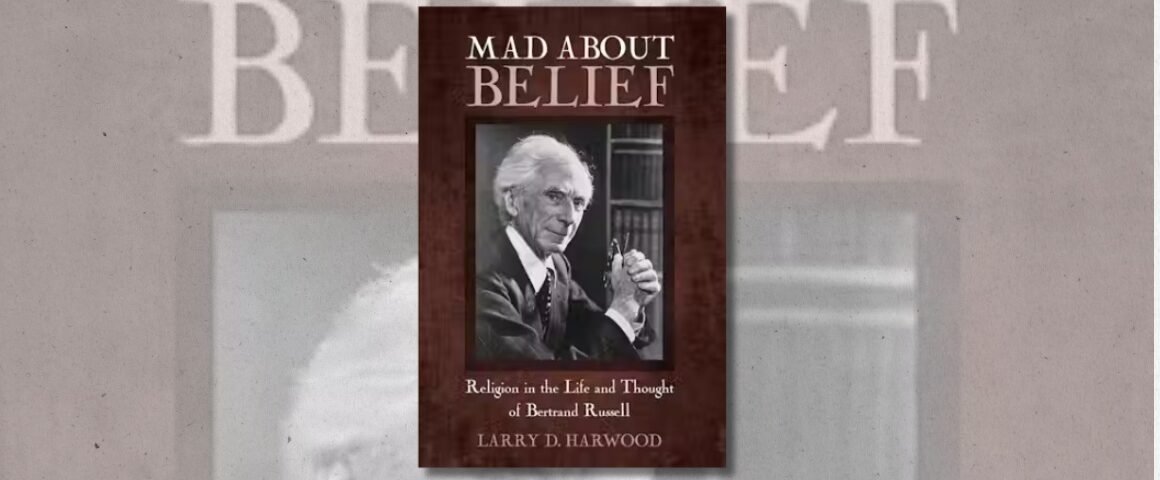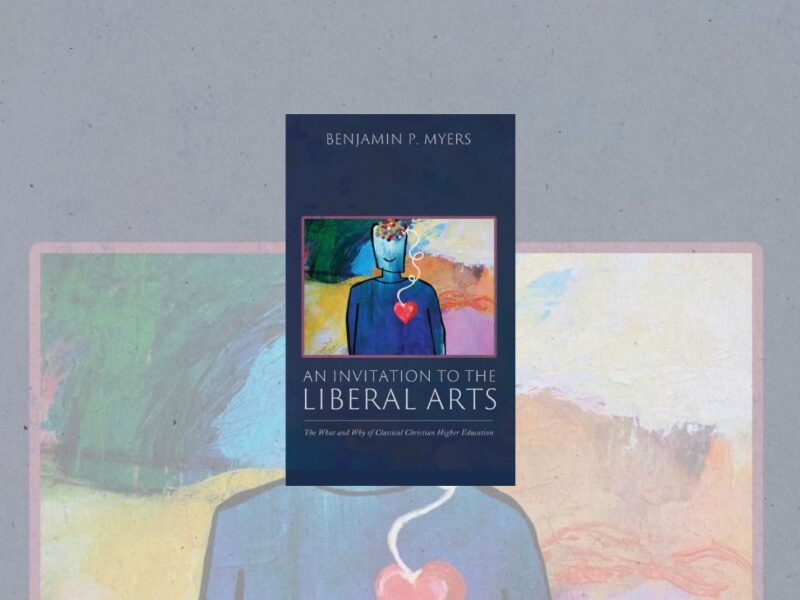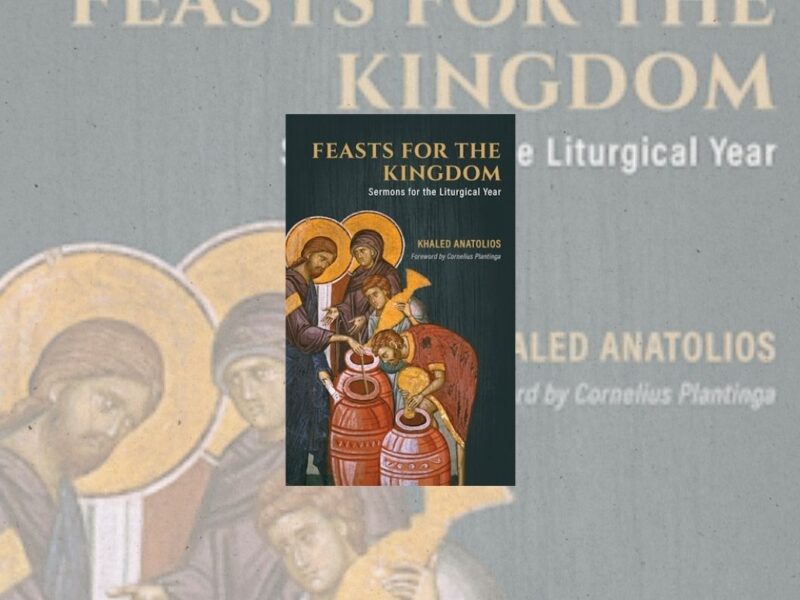Mad about Belief: Religion in the Life and Thought of Bertrand Russell. By Larry D. Harwood. Eugene, OR: Pickwick Publications, 2024. 362 pp. $66 (hardback), $46 (paper).
Bertrand Russell is often analyzed in terms of his philosophical ideas, logic, and critiques of religion. In fact, he is often taken to be a despiser of religion in the tradition of Voltaire. And this, of course, is not without justification. He is quite critical of religion, at least the traditional religions. No surprise, given his most famous piece of writing, Why I am not a Christian. And yet, Bertrand Russell is far too complicated a figure to pin down as simply a despiser of religion. Larry Harwood’s Mad about Belief exposes this deeper side to Russell that reveals aspects of his character, personality, and inclinations that are not only interesting biographically but important to a wider dialectic of philosophy, science, and religion.
That Bertrand Russell is a complex figure when it comes to religion deserves repeating. He was certainly a philosopher. He was a certainly a mathematician. He was also a secular humanist, as he had a role in motivating humanistic thought in societal thinking. Amidst all of these more obvious aspects to his thought and work, Russell simultaneously exhibited the virtues of a philosopher, yet he remained thoroughly unsatisfied with philosophy and religious ideas—at least as they were normally articulated.
While he was a philosopher who initially found some satisfaction in the musings of his mentor Alfred Whitehead, he ultimately found Whitehead’s philosophy both unsatisfying and speculative. Philosophy, at best, he supposed merely led to the clarification of ideas. In that way, it is important to the process of academic study and contributed to other areas of scientific thought. And anyone who has had significant training in philosophy would agree that it is a discipline that trains the mind to think carefully, critically, holistically, and comprehensively. But does it actually lead us to truth? Russell seems to think the answer is “no.” Philosophy is quite disappointing in that regard, Russell thinks.
Anyone familiar with his writings knows that he had no time for the arguments for the existence of God. He had no time for the argument from morality, desire, or pragmatic belief. He found these arguments to be aspects of wishful thinking that play no role in arriving at actual truth. This does not mean that he found these ideas unuseful. He, in fact, found morality, purpose, and a value system quite vital to a developing society. But, unfortunately, for Russell, he remained committed to the belief that philosophy neither gets us to the place of transcendence, religious truth, nor even to truth in general. He found the arguments that occupied much of philosophy of religion, broadly construed, concerned with practical necessity as failures to indicate actual truth. In other words, following Kant (and Kant’s significant place in the history of philosophy of religion), practical necessity does not establish theoretical necessity of which the “arguments” listed above are concerned. Therefore, he rejected Kant’s transcendental reasoning. Then, too, he rejected the philosophical system, often inverting Kant’s transcendental reasoning with phenomenological “givens” (following the existentialists and phenomenologists) as unreliable indicators of truth. His admiration for moral systems led him to see the value of religion, according to Harwood. Russell can’t quite shake religion throughout his life. He saw a need for religion in its aspirational effects on humanity, but not as a source of truth and knowledge. This led Russell at times to take seriously the thought of non-traditional monotheistic religions. While he ridiculed James’s pragmatism, there are signs that Russell was somewhat open to mysticism. The arguments for mysticism, however, were simply uncompelling in the final analysis. And yet, still, he couldn’t quite shake his fixation on religion.
Reason is the way, he would say, but it would fail to give us the way of transcendence. This is unfortunate because for Russell reason was ultimately the way, but it also failed to give us reasons for the transcendence found in religion, at least as it is proposed by religious thinkers. He longed for transcendence, but he just couldn’t quite bring himself to it. I suppose the Calvinist Christian would find his tragic life somewhat understandable, given that reason never does the work of revelation and only revelation could convert the soul to the truth of transcendence. It is unsurprising, then, why we find a growing sense of attention and attraction to Russell’s mystical inclinations in recent research (especially when he discusses science, logic, and mathematics).
All of these ideas are beautifully expounded upon in Harwood’s Mad About Belief. Harwood’s careful research takes the reader through a thoughtful, critical survey of Russell’s religious side and how this side not only sheds light on Russell’s psychology, but also serves as a an important discussion point in intellectual history. It is an important contribution in this regard and deserves careful consideration for those generally interested in philosophy of religion or the history of philosophy, and serves as an interlocutor for theologians interested in the public side of religious thought.
That said, there is one area of study that might further shed light on Russell’s thinking and contribution to religious thinking that would serve as a complement to Harwood’s thesis—the area of consciousness. Consciousness becomes an important overlapping subject of interest that highlights not only the complexity of religious thinking at the intersection of philosophy and science—something Russell was all too keen on highlighting as the primary indicator of truth and sure knowledge, but also it sheds light on what appears to be an ongoing enigma in Russell’s philosophical writings. It remains an area of study in Russell that he fails to reconcile with his love for the empirical method and, at times, his almost idolatrous love for mathematics (what he saw as almost approaching the Divine at times because it was untouched by the messiness of people, history, and religious thinking; and more, he saw it as bearing an apparent kind of perfection granting a certainty to the knowledge it gives, see 287).
Consciousness’s enigma led Russell to posit neutral monism, which has experienced something of a renaissance today. This, too, has become an area of study of significant attention in recent history. Neutral monism is a system of thought that posits that at the most fundamental level there is some underlying ontology that gives rise to two distinct properties, mental properties and physical properties. It has become this line of thinking that has given rise to a new area of fascination—namely, panpsychism (roughly a set of views highlighting the fundamentality of consciousness). An area that we are seeing in recent history has taken many to posit that one can only be explain consciousness by something other than the physicalism so common in Russell’s day. But, even when it came to neutral monism, Russell was altogether skeptical. And, more problematic still for his neutral monism, consciousness becomes a mystery contained in a further mystery.
But the biggest problem, and it is a problem that remains for materialists today, philosophers committed to the austerity of mathematics and the empirical method—they simply can’t explain consciousness! Worse, they have very little to nothing to say about consciousness—their framework actually provides no explanation for consciousness and may even contradict the reality of consciousness. Russell had no answers for consciousness. This becomes important for the present study precisely because it is at this point that consciousness serves as the space between the empirical and transcendence. It is why the existentialists and phenomenologists made so much of consciousness as a pointer to the meaning of ultimate reality. And it is here that Russell finds his ideas in a great deal of tension, not to mention the practical necessity of religious ideas that continue to plague him until his deathbed.
There are several other themes that are picked up on and expounded on as part of the portrait Harwood paints of Russell’s being Mad About Religion. Russell was a puritan (270‒80). He was committed to seeing where rationality would lead. This is why he moved close to Nietzsche, of whom he was otherwise quite critical (280‒88). In some ways, his tensions led him down a more Nietzschean path of not only being a religious critic, but oftentimes agreeing with Nietzsche despite strong criticism of his thought. While Russell concluded with the practical desire for morality that neither religion nor philosophy could satiate distinct from Nietzsche, he could not bring himself to reconcile with any of the traditional religions on offer, nor could he finally, in the end, embrace mysticism. He concluded with no resolution over religious practices. Finally, and undoubtedly, these serve as several of the philosophical and psychological reasons he remained “mad about belief.”





'Book Review: “Mad about Belief”' has no comments
Be the first to comment this post!